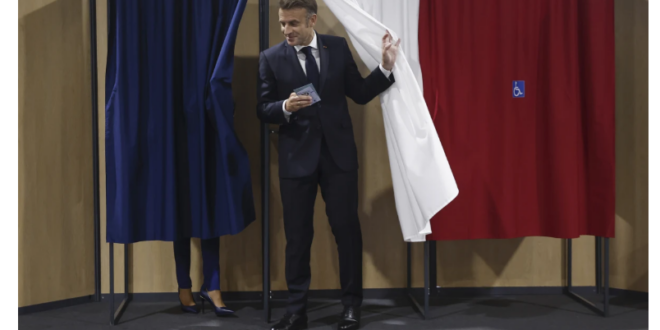Muhamad yehia
French voters have given a broad leftist coalition the mos parliamentary seats in a pivotal legislative election that has kept the far right from power but has put France in the unprecedented position of having no dominant political bloc in parliament.
While a fractured parliament is not uncommon in Europe, France has not experienced that in its modern history. That sends the country into uncharted territory that will involve tense negotiations to form a new government and name a prime minister, who focuses on domestic policy and shares power with the president.
President Emmanuel Macron ’s centrist alliance came in second in Sunday’s run-off for the National Assembly, France’s lower house of parliament, after his centrists and the leftists both campaigned against the far right, with candidates in three-way races dropping out to benefit the one deemed most likely to defeat the far right candidate. The far right party came in third, though still drastically increasing its number of sea
No clear figure has emerged as a possible future prime minister.
Macron can propose a name, but that choice would need support from a parliamentary majority. He says he will wait to decide his next steps, and heads to Washington this week for a NATO summit. New legislators start work Monday, and hold their first session July 18.
A hung parliament
Three major political blocs have emerged — none of them is close to holding a majority of at least 289 seats out of 577. Results so far have showed just over 180 seats for the New Popular Front leftist coalition, 160 for Macron’s Together for the Republic centrist coalition, and more than 140 for the far-right National Rally party.
The National Assembly is the most important of France’s two houses of parliament. It has the final say in the lawmaking process over the Senate, which is dominated by conservatives.
The split lower house will require lawmakers to build consensus across parties to agree on government positions and a legislative agenda. France’s fractious politics and deep divisions over taxes, immigration and Mideast policy make that especially challenging.
The results means Macron’s centrist allies almost certainly won’t be able to implement their pro-business proposals such a promise to overhaul unemployment benefits. It could also make passing a budget more difficult.
Can Macron make a deal with the left
Macron may seek a deal with more moderate elements of the left. France has no tradition of this kind of arrangement, so such negotiations — if they happen — are expected to be difficult and could result in an informal and fragile alliance.
Macron has said he would not work with the hard-left France Unbowed party, but he could stretch out a hand to other parties in the New Popular Front: the Socialists and the Greens. They may refuse to take it, however.
His government last week suspended a decree that would have diminished workers’ rights to unemployment benefits, which has been interpretated as a gesture toward the left.
Some Macron allies are instead pushing to form a government around the centrists and the conservative Republicans who together with their allies came in fourth with over 60 seats. However, that grouping would still need support of additional lawmakers.
 موقع وجه أفريقيا موقع وجه أفريقيا هو موقع مهتم بمتابعة التطورات في القارة الأفريقية
موقع وجه أفريقيا موقع وجه أفريقيا هو موقع مهتم بمتابعة التطورات في القارة الأفريقية



